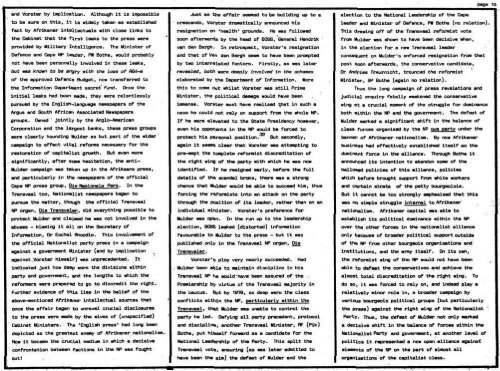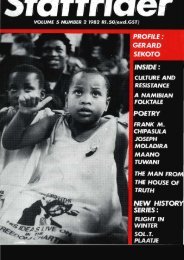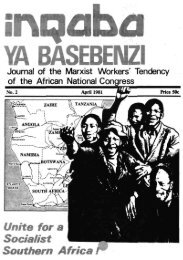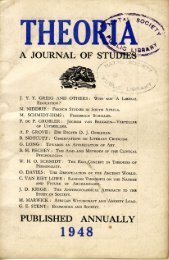Create successful ePaper yourself
Turn your PDF publications into a flip-book with our unique Google optimized e-Paper software.
end Vorster by implication. Although it is impossible<br />
to be sura on this, it la widely taken aa established<br />
fact by Afrikaner intellectuals with close links to<br />
the Cabinet that the first leaks to the press eera<br />
provided by unitary Intelligence. The Minister of<br />
Defence and Cape NP leader, PV Botha, eould probably<br />
not neve been personally Involved in these leeks,<br />
but eaa known to be angry with the loss of RW a<br />
of the approved Defence Budget, now transferred to<br />
the Information Department secret fund. Once the<br />
initial leaks had been made, they were relentlessly<br />
pursued by the Englletwlanguage newspapers of the<br />
Argus and South African Associated Newspapers<br />
groups. Owned ' Jointly by the Anglo-American<br />
Corporation and the largest banks, these press groups<br />
mere clearly hounding Mulder as but part of the wider<br />
campaign to effect vital reforms necessary for the<br />
restoration of capitalist growth* But even more<br />
significantly, after some hesitation, the enti-<br />
Hulder compaign was taken up in the Afrikaans press,<br />
and particularly in the newspapers of the official<br />
Cape hP press group, Ojg Nanionale Pers. In the<br />
Transvaal too, Nationalist newspapers began to<br />
pursue the matter, though the official Transvaal<br />
NP organ, Ola Transvaler. did everything possible to<br />
protect Mulder and claimed he was not involved in the<br />
ebuses * bleming it all on the Secretary of<br />
Inforaetlon. Or Eachel Rhoodie. This involvement of<br />
the officlel Nationalist party press in a campaign<br />
agelnst a government Minister (and by implication<br />
against Vorster himself) was unprecedented. It<br />
Indicated Just how deep were the divisions within<br />
party end government, end the lengths to which the<br />
reformers were prepared to go to discredit the right.<br />
Further evidence of this lias in the belief of the<br />
ebove-amntioned Afrikaner intellectual aources that<br />
once the affair began to unravel cruclel dlscloaures<br />
to the press were made by the wives of (unspecified)<br />
Ceblnet ministers. The 'English press* had long been<br />
depicted es the greatest enemy of Afrikaner nationalism.<br />
Horn it became the crucial medium in which a decisive<br />
confrontation between factions in the hP was fought<br />
put!<br />
Just as the effalr seemed to be building up to a<br />
crescendo, Vorster dramatically announced his<br />
resignation on 'health' grounda. He wes followed<br />
soon afterwards by the head of BOBS, General Hendrlk<br />
van den Bergh. In retrospect, Vorster's resignation<br />
and that of Van den Bergh seem to have bean prompted<br />
by two interrelated factors. Firstly, mm was later<br />
revealed, both were deeply involved in the schemes<br />
elaborated by the Department of Information. Ware<br />
this to coma out whilat Vorster was still Prime<br />
Minister, the political demoge would have been<br />
lmmenaa. Vorster aust have realised ^iet In such a<br />
case he could not rely on support from the mhole NP.<br />
If he were elevated to the State Presidency however,<br />
even his opponents in the NP would be forced to<br />
protect his peraonel position. But secondly,<br />
again it seem* clear that Vorster was attempting to<br />
pre-empt the complete reformist diacredltetion of<br />
the right wing of the party with which he eaa now<br />
Identified* If he rmslgnad early, before the full<br />
detaila of the scandal broke, there was a strong<br />
chance thet Mulder mould be eble to succeed hie, thus<br />
forcing the reformists Into en ettaok on the party<br />
through the position of ite leader, rather than on an<br />
Individual minister. Vorater's preference for<br />
Huider was open* In the run up to the leadership<br />
election, BOBS leaked (distorted) Information<br />
favourable to lajlder to the press - but it was<br />
published only in the Tranavaal W organ. Die<br />
Transvaler.<br />
Vorster**, ploy very nearly succeeded. Hed<br />
Huider been able to maintain discipline in his<br />
Transvaal NP ha eould 1 have been assured of the<br />
Premiership by virtue of the Transvaal majority in<br />
the caucus. Out by 1976, so deep were tha class<br />
conflicts within the NP, particularly within the<br />
Transvaal, that Mulder wee unable to control the<br />
party he led. Defying all party precedent, protocol<br />
and discipline, another Tranavaal Minister, AF (Pik)<br />
Bothet put himself forward as a candidate for tha<br />
National Leadership of the Party* This split tha<br />
Trenevaal vote* ensuring (es eas later admitted to<br />
have been the aim} the defeet of Mulder mod the<br />
election to the Notional Leadership of the Cape<br />
page 14<br />
leader end Minister of Defence, P» Botha (no relation).<br />
This drawing off of tha Transvaal reformist vote<br />
from Mulder was shown to have been decisive when,<br />
in tha election for e new Tranavaal leader<br />
consequent on Mulder's enforced resignation from that<br />
post soon afterwards t tha conservative candidate,<br />
Or Andrlea Treurnlcht, trounced tha reformist<br />
Minister, SP Botha (again no relation).<br />
Thus the long campaign of press revelations and<br />
judicial enquiry fatally weakened tha conservative<br />
wing at a crucial moment of the struggle for dominance<br />
both within tha NP and the government. The defeat of<br />
Mulder marked a significant shift in the balance of<br />
claaa forces orgenlsed by the NP gua party under the<br />
banner of Afrikaner nationalism. By now Afrikaner<br />
business hed effectively established itaalf as tha<br />
dominant force In the allience. Through Bothe It<br />
announced ite Intention to abandon some of the<br />
hallowed policies of thle alliance, policies<br />
which before brought support from white workers<br />
and certain strata of the petty bourgmolaie.<br />
But it cannot be too strongly emphasised that this<br />
eas no simple struggle Internal to Afrikaner<br />
nationalism. Afrikaner capital erne eble to<br />
establlah its political dominance within the NP<br />
over the other forces in the nationaliat alliance<br />
only because of broader political support outside<br />
of the- NP from other bourgeois organisations and<br />
institutions, and the ermy itself. On its oen,<br />
the reformist wing of the NP would not neve been<br />
able to defeet tha conservatives and achieve the<br />
almost total diacreditatlon of tha right eing. To<br />
do so, it eaa forced to rely on, and indeed play a<br />
relatively minor role in, e breeder campaign by<br />
various bourgeois political groups (but partlculerly<br />
the prase) egeinst ths right wing of the Nationalist<br />
Party. Thue, tha defeat of Mulder not only marked<br />
a decisive shift in the belence of forcea within the<br />
Nationalist Party end government, et enother level of<br />
politics it represented e now open allience against<br />
elements of the NP on the pert of elmoat all<br />
crgsnlsetlone of the capitalist class.

















